Qatar Museums and Venice’s new protocol of co-operation includes aim of restoring ‘symbolic parts of the city’

Qatar Museums and the city of Venice have announced a protocol of co-operation, to build on their existing relationships and to develop collaboration in cultural fields, including the “implementation of structural interventions aimed at restoring some symbolic parts of the City of Venice”.
Cultural heritage, art and preservation are among the fields covered by the protocol, alongside education, business investment, sport and entertainment. The announcement of the protocol was made earlier this month during the Art for Tomorrow conference, presented in Venice by the Democracy & Culture Foundation with the conference’s founding partner Qatar Museums.
In Venice this year, Qatar Museums has produced the exhibition Your Ghosts Are Mine, Expanded Cinemas, Amplified Voices, on show at ACP-Palazzo Franchetti, on the Grand Canal, co-organised by the Doha Film Institute, Mathaf Arab Museum of Modern Art and the future Art Mill Museum. The exhibition runs until 24 November, covering the duration of both the Venice Biennale and the Venice Film Festival. Loans from Qatar Museums are on view in Foreigners Everywhere, the flagship international exhibition of the 2024 Venice Art Biennale, curated by Adriano Pedrosa, and in the Worlds of Marco Polo exhibition at the Doge’s Palace, including objects from the Museums of Islamic Art.
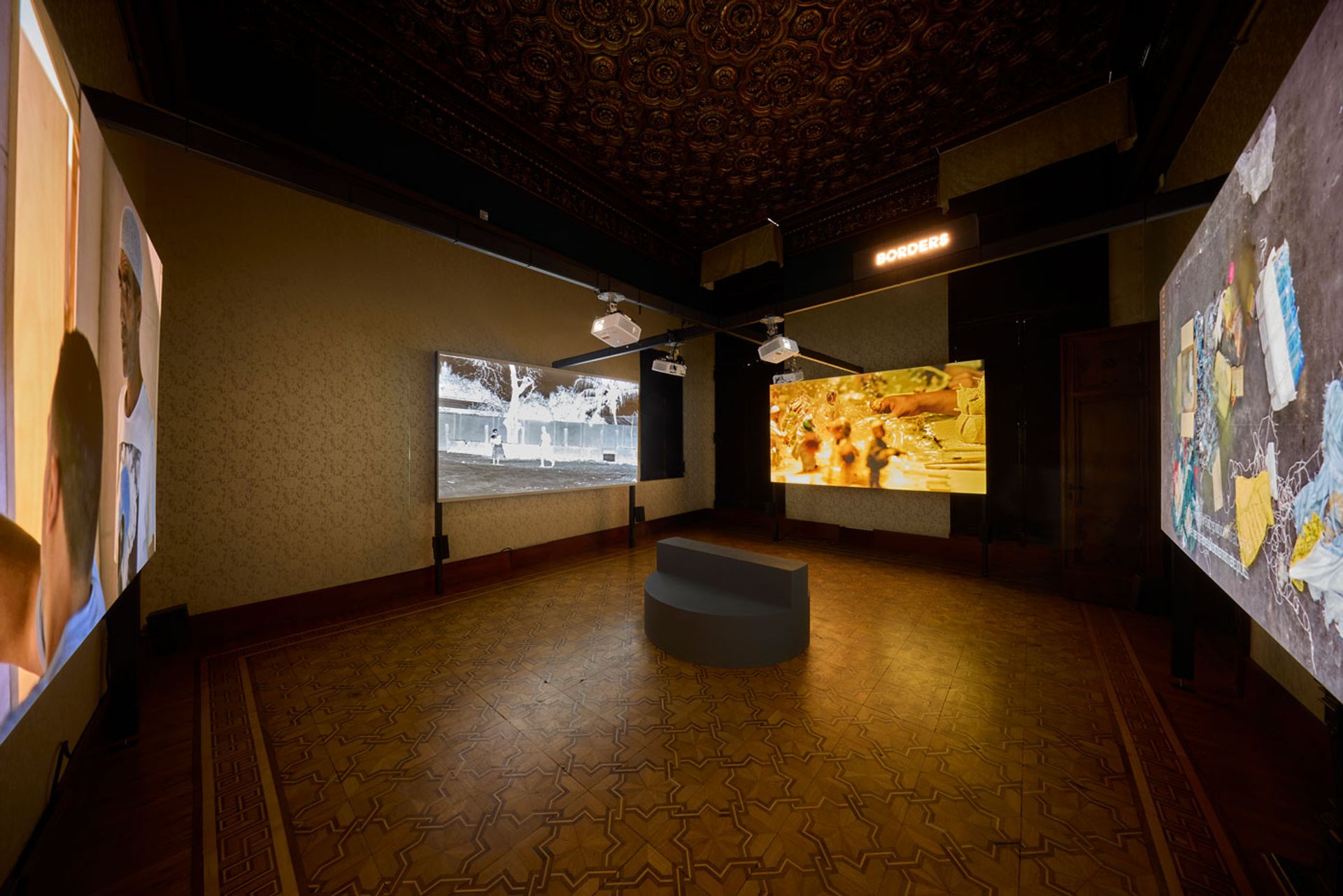
Borders, an installation from Your Ghosts Are Mine—Expanded Cinemas, Amplified Voices, an exhibition produced by Qatar Museums at ACP Palazzo Cavalli-Franchetti, in Venice © David Levene 2024. Courtesy Qatar Museums
Sheikha Al Mayassa bint Hamad bin Khalifa Al Thani, chairperson of Qatar Museums, said: “On the occasion of the re-launch of Doha-to-Venice direct flights [by Qatar Airways on 12 June], we are happy to convene the art world here in Venice. Art for Tomorrow is an on-going partnership between Qatar Museums and the Democracy & Culture Foundation that brings thinkers, artists and creatives together. This year, as we use Venice as a cultural backdrop, we are happy to continue to explore closer relationships between our two cities, and our nations as a whole. We look forward to welcoming Venetians to Qatar, and invite Qataris to visit Venice’s cultural offerings.”
Among potential activities covered by the protocol are, according to a joint statement, “mutual co-operation for the protection and regeneration of cultural heritage, including the … implementation of structural interventions aimed at restoring some symbolic parts of the City of Venice”. Other planned activities include the organisation of exhibitions, seminars, covering the historic links between Italian and Islamic art and architecture; the participation of Venetian and Qatari artists in festivals and exhibitions; and scholarly collaborations on art publications and research visits.
“We hope to work with the City of Venice in a variety of ways on many of these projects,” Mohammed Saad Al Rumaihi, chief executive of Qatar Museums, tells The Art Newspaper. “In each case, our ambition is to focus on initiatives that touch on our shared histories and aspirations. These historic ties are a natural basis for working together on contemporary cultural projects—for example, by potentially ensuring that our artists are mutually represented in the major exhibitions that regularly take place in Venice and in Doha.”
The announcement of the protocol, and the related potential restoration of parts of Venice, comes in a year when experts have warned that the waterbound city—whose preservation has been a marquee project for both environmental and architectural conservationists over the past seven decades—and the whole of Italy urgently need a concerted plan to address the encroachment of rising sea levels; and when the city’s leading conservation architect has warned that the rising water levels in the Venetian lagoon are threatening the structural integrity of the city’s matchless ensemble of historic houses.
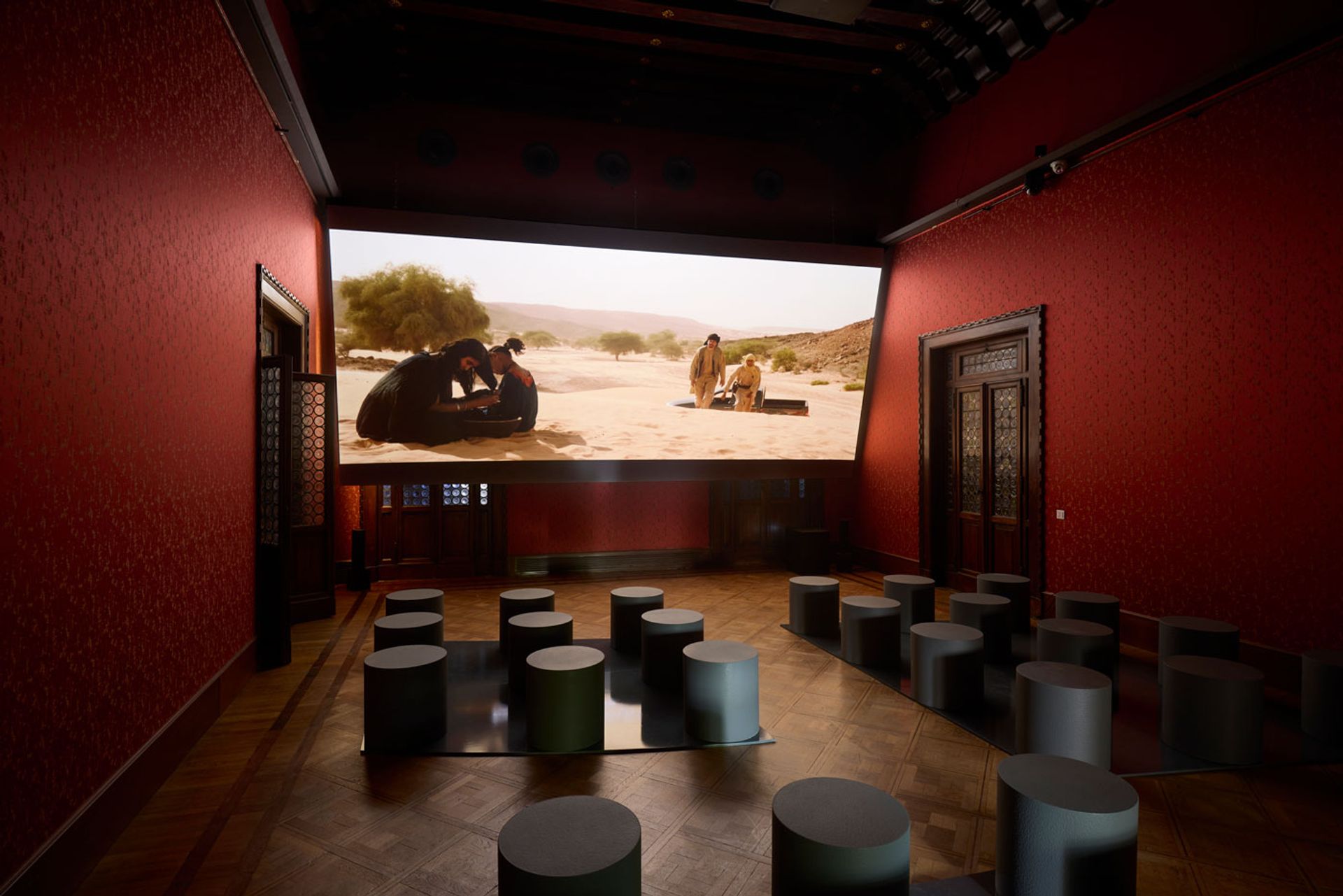
Deserts, the opening art-video installation of Your Ghosts Are Mine—Expanded Cinemas, Amplified Voices, an exhibition produced by Qatar Museums at ACP Palazzo Cavalli-Franchetti, in Venice © David Levene 2024. Courtesy Qatar Museums
Your Ghosts Are Mine
For the exhibition Your Ghosts Are Mine—Expanded Cinemas, Amplified Voices at ACP Palazzo Franchetti, Matthieu Orléan—a curator and head of temporary exhibitions at La Cinémathèque Française, in Paris—has selected films produced, co-produced or initiated by the Doha Film Institute (DFI) over the past 14 years, as well as video installations from the collections at Mathaf: Arab Museum of Modern Art and the future Art Mill Museum. The exhibition is built around a sequence of ten themes—Deserts, Ruins, Fires, Borders, Dance, Futurism, Cosmos, Deliverance, Exile and Fantasma—under which Orléan has presented a series of video installations, one room to a theme, and, in a separate space, showings of selected films, Thursdays to Sundays until 24 November, from over 700 examples that have been supported by the DFI since its foundation in 2010.
Orléan put the show together in three months, a tight timetable. But, he tells The Art Newspaper, “everyone was so efficient in the committee, in the institution”, while the set designing company, the Rotterdam-based company Cookies, led by Federico Martelli, “was great”. They have partnered with the architect Rem Koolhaas for some years and were “super reactive”.
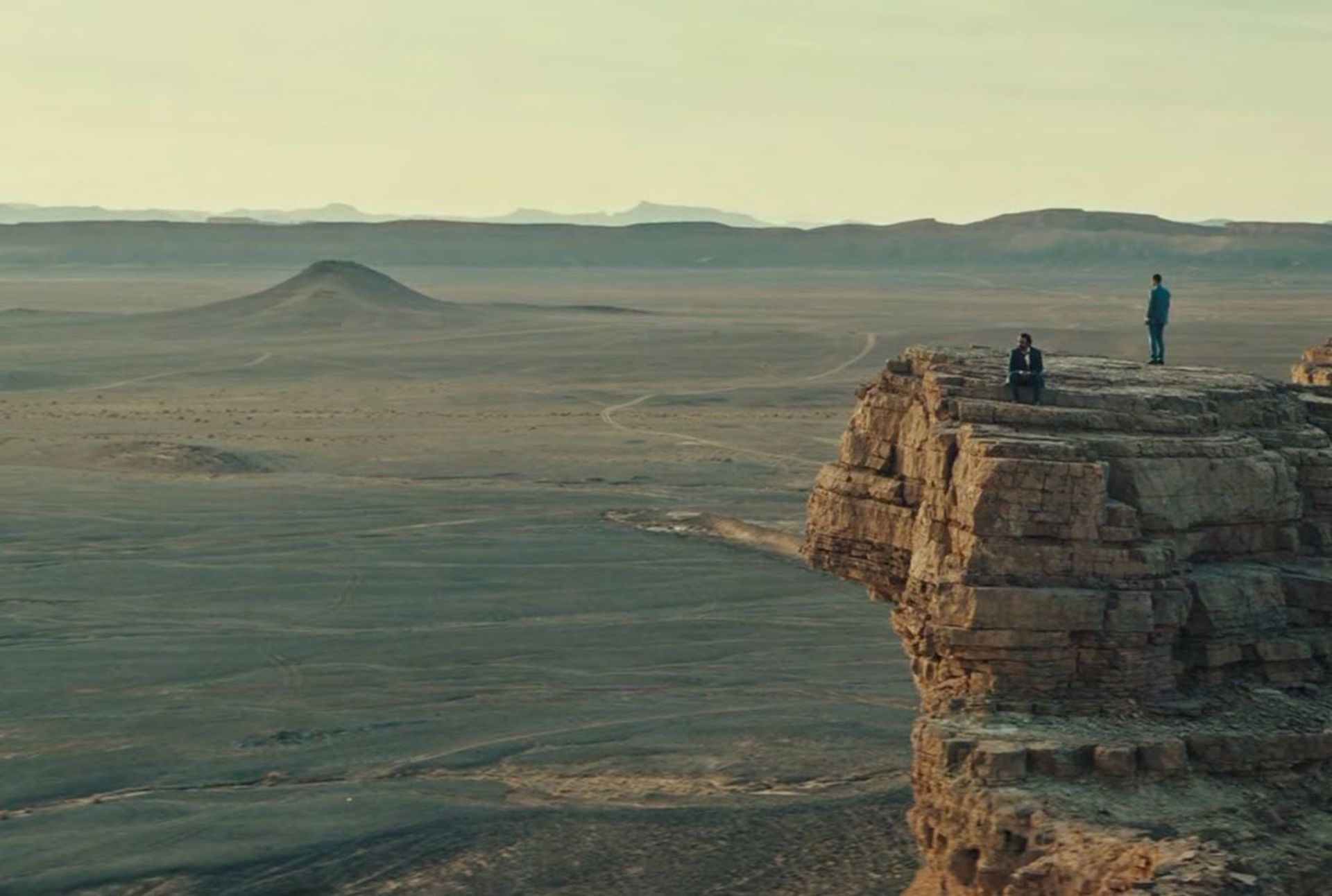
The Moroccan artist and film-maker Faouzi Bensaïdi’s Deserts, 2023—the story of two debt-collectors who end up on a mystical journey after being sent out into the Sahara to track down bad payers—features in the Deserts section of Your Ghosts Are Mine—Expanded Cinemas, Amplified Voices Courtesy of Qatar Museums and Doha Film Institute
Orléan says that the show is designed to explore “independent film-making voices from the Middle East, Africa and Southeast Asia”. The selected films cover an enormous range of genres and subject matters, but have a few characteristics in common, he says: a clear vision of their societies, whether in intimate diaries or documentary; and a clear vision of the future, “about what could happen and what could change”. They also tend not to belong to “conventional storytelling” or to the tropes of mainstream movies.
In order to organise both video sequences for room-sized installations, and the films for full-length screenings, Orléan came up with the ten themes. “So there is really a point A and a point Z, a narrative in a way” through the exhibition. He thinks of the show as an “open space and you can go from one place to another”, but with the themes telling the story, anchored by an opening subject with powerful associations: Deserts.
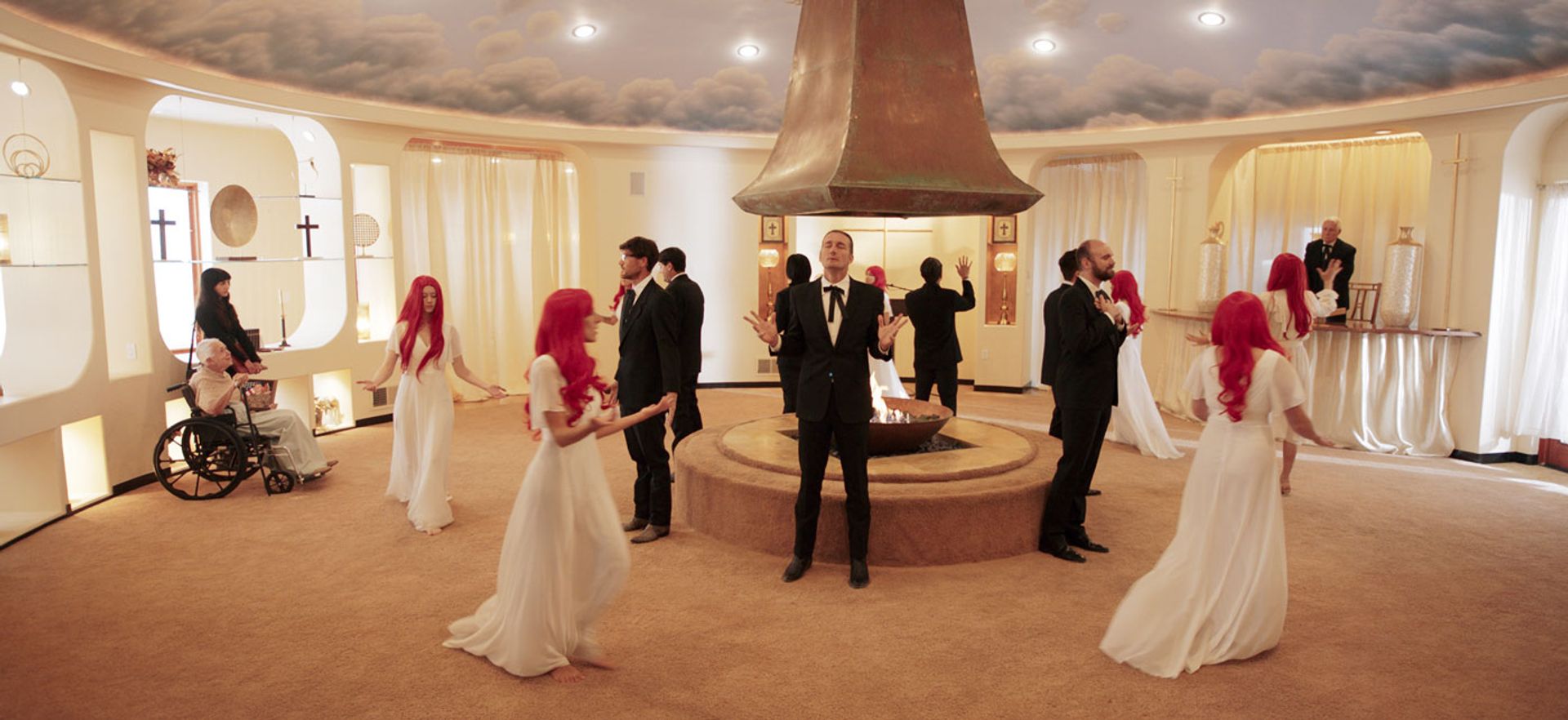
The Iranian-born artists and film-makers Shirin Neshat and Shoja AzariIn set Land of Dreams (2021)—a story set in the future of an Iranian-born woman working for the US Census Bureau which has set up a programme to record the dreams of the citizens the better to control them—in the desert of the western United States. It features in the Deserts section of Your Ghosts Are Mine—Expanded Cinemas, Amplified Voices Courtesy of Qatar Museums and Doha Film Institute
“In Arab literature, both sacred and secular,” Orléan writes in the catalogue, “the desert is the place where something irreversible happens—going on a pilgrimage or wandering can result in an ordeal followed by a shattering revelation. It is a metaphysical space that contemporary cinema directors have made their own.” Deserts are “something that film-makers are very interested in deconstructing”, the curator adds, “showing all the faces of what the desert could be. It’s a mix of death and life, of madness. There’s a lot of movies dealing with borderline characters whose encounter with the desert is spiritual but also has a kind of danger to it.”
In the exhibition, four video artists are given particular attention. The Afghanistan-born, US-based Lida Abdul is showing a four-minute loop, Dome (2005), in which she documents a chance encounter with a young boy wandering a war-ravaged landscape. The Egyptian artist Wael Shawky—whose work is featured in the Egyptian Pavilion at the Biennale—is represented by Al Araba Al Madfuna III (2016), inspired by his weeks-long visit to the village of that name next to the archaeological site of a pharaonic kingdom in ancient Egypt. The UK-born Egyptian artist Hassan Khan is showing Jewel (2010), a loop of the artist’s re-creation of a scene he witnessed from a passing taxi on a summer evening in 2006: of two men dancing on a crowded Cairo street. The Qatari American artist Sophia Al Maria is featured with two works—Black Friday (2016), described in the catalogue as “a rumination on shopping malls as secular temples of capitalism” and The Future was Desert II (2016) on the complex connections between dependence on fossil fuels and environmental devastation.
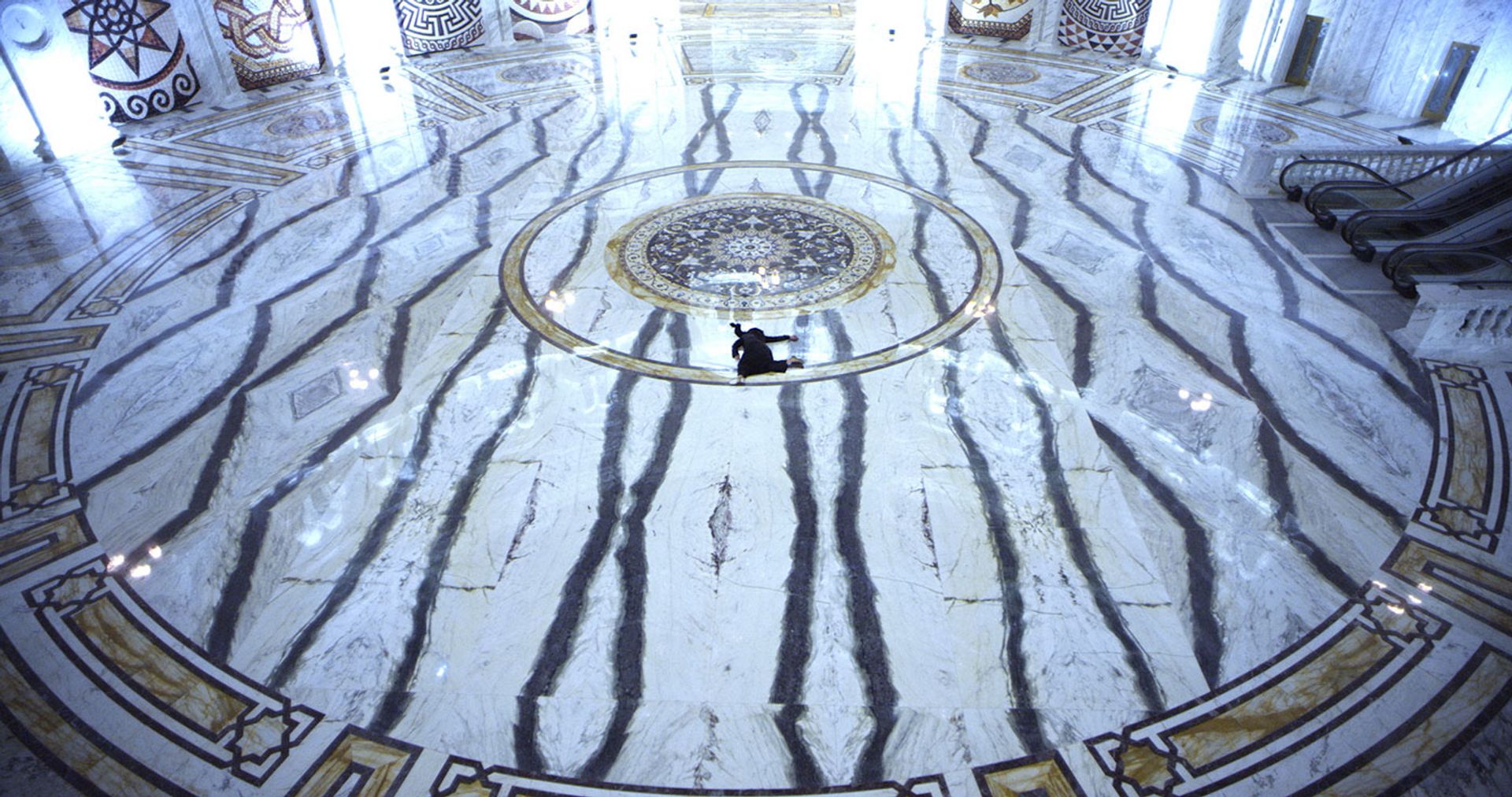
Sophia Al Maria, still from Black Friday (2016), one of two of the Qatari American artist’s videos showing in the exhibition Collection of the artist; courtesy The Third Line, Dubai
The “ghosts” of contradictory emotions
Sophia Al Maria plays in her work with past and future. One of the strands that struck Orléan most when selecting works for the exhibition was how artists and film-makers worked with time and with science fiction. The latter, in some cases, served as a proxy for addressing difficult contemporary social issues. Coping with social challenges, with reality, as well as with temporal and narrative ambiguity, were elements that informed the use of “ghosts” in the naming of the show.
That “ghost”, Orléan says, “is not so much what you should be afraid of. It represents a connection to subconscious, to history, to the past, to also the power of nature, to something from inside the earth but also from space. It’s also about contradictions. And a lot of these movies are contradictory because the ghost is both alive and dead. I like this contradictory image; a lot of the movies are dealing with contradictory emotions or contradictory spaces—dealing with the past, dealing with archives, dealing with the world today and the world of the past.”
Your Ghosts Are Mine, Expanded Cinemas, Amplified Voices. Produced by Qatar Museums; co-organised by Doha Film Institute, Mathaf Arab Museum of Modern Art and the future Art Mill Museum, in collaboration with ACP Art Capital Partners. ACP-Palazzo Franchetti, Venice, until 24 November.
Source link





